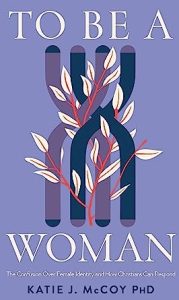Does Christianity have anything important to say about the issues that are overwhelming Western culture? Isn’t it more loving to just accept people how they are and support them in their decisions as long as they’re not hurting anyone? If Jesus were here, wouldn’t He just love people?
 These are questions that aren’t uncommon in our day. In fact, those who don’t support Christian views are quick to tell how people should respond. Can Christianity actually speak gracefully, yet truthfully to significant issues? Thankfully the answer to that question is a resounding “yes.”
These are questions that aren’t uncommon in our day. In fact, those who don’t support Christian views are quick to tell how people should respond. Can Christianity actually speak gracefully, yet truthfully to significant issues? Thankfully the answer to that question is a resounding “yes.”
An excellent example of this in practice is the new book, “To Be A Woman” by Katie McCoy. The title assumes that people would need to understand what it actually means to be a woman.
In any other time, that might seem absurd. But as McCoy recalls, a Supreme Court nominee, just last year, was asked to define a woman. The nominee responded, “I’m not a biologist.” Was the now Justice really confused about what a woman really was? Or did she recognize a now culturally divisive issue and did not want her answer scrutinized? The answer is clearly the latter.
The issue of transgenderism and its acceptance seem to have burst upon the scene within the last several years. Hollywood regularly uses transgender characters, and local and national media have quickly begun using “preferred pronouns” like “they/them,” making some news stories practically incoherent.
Is this a moment when Christians are being “sticks in the mud” by not jumping on board? Or is there something deeper at play? McCoy makes the case that what it means to be a woman goes beyond what can be answered through social acceptance, puberty blockers, hormone treatments or even gender transition surgeries.
According to McCoy, there are philosophical, biological and theological foundations that cannot be ignored and certainly cannot be changed. The main point she proves in the book is “Female identity is socially guided, philosophically formed, relationally confirmed and theologically bestowed.”
In short, female identity is not some contrived status that is “assigned at birth.” Human biology is a good, designed by God, not a hindrance to be overcome.
So why do so many believe the opposite? McCoy explains how many have imbibed the philosophy of Rousseau, “our feelings comprised the core of our true selves.” Not only that, but when a boy or girl or man or woman begins to question their gender, they receive almost instant affirmation from social media and the medical community.
Teenagers who are constantly seeking acceptance find community as they begin to make the transition. But there is more going on than just social acceptance.
A teenager begins acting and dressing like the new gender. The brain then adapts to the new behavior. Following the behavior comes hormone treatment. But as McCoy explains, the effects of these drugs are not benign.
Often when gender transition drugs are used for other purposes than what they were invented for, it results in long-term negative side-effects that are exacerbated through application during puberty. This creates a haunting effect, “The single most influential factor in outgrowing childhood gender dysphoria is experiencing puberty, but if you have childhood gender dysphoria, you’re prescribed puberty blockers.”
There’s something missing in portrayals of gender transition. Media and Hollywood give us Disney fairytale endings to change stories. Someone switches to their new gender and “all live happily ever after.”
But that is often not the case. Laura Perry Smalts’ story has been featured in the Baptist Messenger. She made the transition hormonally and surgically and lived as a man for nine years. It wasn’t until she turned to Christ that she experienced the transformation she truly needed.
There are many who make such transitions, only to find that things aren’t quite the way they were painted. Often parents are told that questioning their teens’ feelings of transition could lead to suicide.
McCoy presents evidence that those who make these transitions are actually more likely to attempt suicide. An analysis of the fine print does not show the rosy picture that dominates the media landscape.
So why read a book on a topic so controversial? Our culture is confused. As Christians, we have the truth. There are underpinning realities that can help to clear up some of the overwhelming confusion in our culture.
There is backlash to the transgender movement, highlighted especially in what is going on in women’s sports. But backlashes don’t respond in grace. We as believers respond to those we disagree with in grace and truth. Our arrogance and self-righteousness vanish at the cross where we all stand as beggars.
McCoy’s book helps to speak the truth in a culture that is desperate for it.
Photo by Matias North on Unsplash





